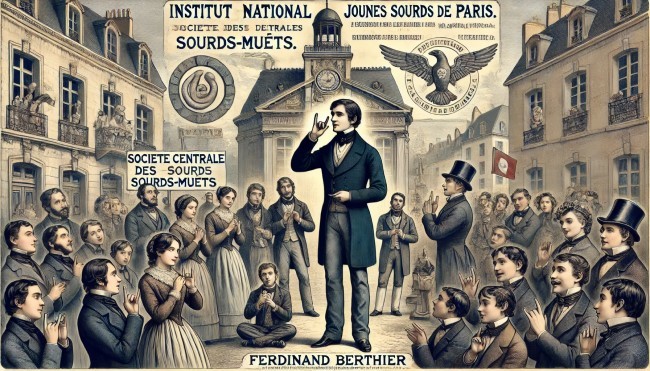Ferdinand Berthier: Pioneer of Deaf Education and Advocacy
How Ferdinand Berthier Revolutionized Deaf Rights and Education

Ferdinand Berthier was a trailblazer in the world of deaf education and advocacy. His relentless efforts in promoting deaf culture, sign language, and the rights of deaf individuals have left an indelible mark on history. As the founder of the first organization for the deaf, the Société Centrale des Sourds-Muets, Berthier’s contributions continue to inspire and guide modern advocacy for deaf rights and education.
Introduction
Ferdinand Berthier’s name is synonymous with groundbreaking advancements in deaf education and advocacy. From his early days at the Institut National de Jeunes Sourds de Paris to founding the Société Centrale des Sourds-Muets, Berthier’s life was dedicated to improving the lives of deaf individuals and promoting the use of sign language. This article delves into his life, achievements, and enduring legacy.
Early Life and Education
Born on September 30, 1803, in Louhans, France, Ferdinand Berthier became deaf early in his childhood. He was enrolled in the Institut National de Jeunes Sourds de Paris at eight. Berthier thrived under the guidance of renowned educators such as Abbé Roch-Ambroise Sicard and Jean Massieu. These mentors, particularly Roch-Ambroise Auguste Bébian, who was instrumental in developing sign language as a legitimate communication, heavily influenced Berthier’s educational philosophy and advocacy work.
Rising as an Educator and Advocate
By the age of 27, Berthier had risen to a senior teaching position at the Institut National de Jeunes Sourds de Paris—his commitment to deaf education extended beyond the classroom. In 1830, he founded the Institution Nationale des Sourds-Muets à Paris, a centre dedicated to advancing sign language pedagogy. Berthier emphasized the importance of sign language in fostering cognitive and linguistic development among deaf children, challenging the prevailing oralist methodologies of the time.
Founding the Société Centrale des Sourds-Muets
In 1838, Berthier’s vision for a cohesive deaf community materialized with the founding of the Société Centrale des Sourds-Muets. This organization was the first of its kind, representing the interests of the global deaf community. It provided a platform for mutual support among deaf workers, offered adult education classes, and advocated for the use of sign language. The society’s mission was to bridge language, culture, and law gaps to unite deaf individuals worldwide.
The Silent Banquets
One of Berthier’s notable contributions to deaf culture was the initiation of the Silent Banquets in 1834. These annual events celebrated the birthday of Abbé Charles-Michel de l’Epée, a pioneer in deaf education. The banquets served as a gathering point for the deaf community, fostering a sense of solidarity and cultural pride. The tradition of Silent Banquets spread internationally, influencing similar events in countries like the United States.
Literary Contributions and Advocacy
Berthier was also a prolific writer. He authored numerous works advocating for recognizing sign language as a legitimate language with its grammar and syntax. His writings and lectures influenced educators and policymakers across Europe, promoting the integration of sign language into educational curricula. Berthier’s works highlighted the rich history and culture of the deaf community, showcasing the contributions of deaf artists and sign-language poets.
Recognition and Legacy
In 1849, Ferdinand Berthier became the first deaf person to be awarded the Chevalier de la Légion d’honneur, France’s highest order of merit. This recognition underscored his significant contributions to deaf education and advocacy. Berthier’s influence extended internationally, affecting educational practices and policies regarding deaf education across Europe and beyond. His legacy is reflected in modern-day deaf education and advocacy, where his principles of inclusion, respect for linguistic diversity, and cultural pride continue to resonate.
Challenges and Societal Impact
Berthier’s advocacy was challenging. He navigated a repressive social and political climate that often marginalized deaf individuals. Despite this, he remained a steadfast defender of deaf identity and sign language. His efforts laid the groundwork for the modern deaf rights movement, inspiring future generations of activists and educators.
International Influence and Collaboration
Berthier’s work transcended national borders. He collaborated with educators and advocates from other countries, exchanging ideas and methodologies to advance deaf education. His efforts contributed to establishing schools and institutions dedicated to the education of deaf individuals, incorporating his principles of sign language pedagogy.
Conclusion
Ferdinand Berthier’s life and work exemplify the transformative power of advocacy and innovation in promoting social change. His pioneering efforts in deaf education and sign language advocacy challenged societal attitudes, expanded educational opportunities, and empowered deaf individuals to assert their linguistic and cultural identities. Berthier’s legacy inspires generations of educators, advocates, and policymakers committed to advancing the rights and well-being of deaf communities worldwide. He remains a towering figure in the history of deaf education, revered for his vision, dedication, and enduring impact on the lives of countless individuals within the deaf community and beyond.
References
- Berthier, F. (1836). Histoire et statistique de l’éducation des sourds-muets.
- Hearing Health & Technology Matters. (2013). Who Was Ferdinand Berthier?
- Wikipedia. (2023). Ferdinand Berthier.
- Frank Modell. (2024). Ferdinand Berthier: A Legacy of Advocacy and Innovation.
Ferdinand Berthier
Ferdinand Berthier was a pioneering figure in deaf education and advocacy. He founded the first organization for the deaf, the Société Centrale des Sourds-Muets, and initiated the tradition of Silent Banquets to celebrate deaf culture. Berthier’s efforts in promoting sign language and defending deaf identity laid the groundwork for modern deaf rights movements, earning him the prestigious Chevalier de la Légion d’honneur. His legacy continues to influence deaf education and advocacy globally.



